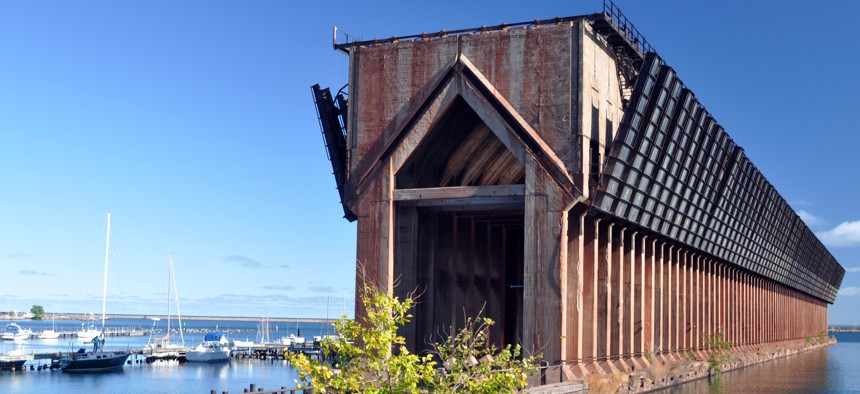Connecting state and local government leaders
Building a strong identity can create fiercely loyal allegiances that capture hearts and minds, writes the city manager of Marquette, Michigan. It can also attract diaspora communities home.
Placemaking is an important concept for any community, but especially for micropolitan communities across the United States. We asked William Vajda, the city manager of Marquette, Michigan, an Upper Peninsula city with more than 20,000 residents, to discuss how by creating a strong identity, micropolitan areas can punch above their weight class.
MARQUETTE, Mich. — The differences between rural and urban development needs come into no clearer focus than for the more than 536 micropolitan communities across the United States.
The U.S. Census Bureau characterizes these areas as having an urban core of less than 50,000 population together with a high degree of economic and social integration with adjacent communities.
Attracting and retaining talent are as critical for micros as metros, but as the “man in the middle,” the additional pressures on micros to compete with non-micro career opportunities, amenities, and lifestyles are daunting. Building a strong micropolitan identity can create fiercely loyal allegiances that capture hearts and minds across time and space.
Most micropolitan areas combine an urban core with surrounding “ru-reality,” and provide fascinating crucibles for policy debate. They can be located between densely populated cities within emerging “mega-regions,” or as virtual city-states surrounded by sparsely peopled rural areas. As such, micropolitans are at the cutting edge of the rural-urban duality, and in many ways, insights provided through their experience can inform national policy towards economic growth and prosperity.
Given micropolitan experience have been well studied, what aspects might not be captured by the numbers alone?
For example, do people who choose to live in micropolitan areas identify themselves as “urban,” “rural,” “rural-urbanites,” or “urban-ruralites”? Local identity is becoming increasingly more relevant in micropolitan economic development, and intangible elements of lifestyle contribute significantly to personal location decisions.
The Michigan Municipal League’s seminal study on The Economics of Place identifies “placemaking” best practices with a focus on community building towards talent and investment attraction. As such, placemaking provides a focused strategy for improving the community “brand.”
Marquette is a micropolitan on the shores of Lake Superior that’s home to dedicated and loyal constituents. Long considered the “Queen City of the North,” it is largest city on Michigan’s Upper Peninsula and is the micropolitan hub of the central portion of the U.P.
“Yoopers” are fiercely proud of their U.P. heritage, and as such, people carry their experiences as a defining attribute of their life. Yooper pride becomes a tie that binds people with place, and as such, once a Yooper always a Yooper!
The city of Marquette, the seat of Marquette County, maintains links with residents who migrate outside the area, including support for Yooper groups in such places as Colorado and Florida, as well as reaching out to cities with high concentrations of Yooper emigrants in Alaska, California and Minnesota.
Marquette routinely honors residents who work or serve overseas as “honorary ambassadors,” and provides them with the means to share local stories and information about the community and all it has to offer.
Marquette seeks to leverage this cultural identity for growth and development advantage. Many nations allow expatriates to retain dual citizenship as a means to entice repatriation of skills and wealth gained abroad. They capitalize on long-standing multi-generational investments in culture and place to enhance competitive knowledge and economic base. Interesting parallels are found in micropolitan America.
A common lament in Marquette is the “loss” of youthful talent to larger metropolitan cities. These choices when viewed through a different lens are remarkably similar to a diasporas — scattered populations with a common homeland.
For micropolitan areas with strong cultural identities—e.g., the Cajuns of Louisiana, the Floridians of the Conch Republic, or, of course, the Yoopers—the movement of talent outside the community may be viewed as a necessary investment towards gaining more valuable talent upon future return.
Of course, the key is to provide incentives to keep the move as temporary, and the trick is to remain focused on creating a place successful Yoopers want to return to.
Interestingly, modern telecommunications is enabling local and cultural identity to transcend former constraints of geography and language. As a result, successful micropolitans are learning to expand their constituency through virtual communities of like-minded people, and to leverage these connections for economic vitality.
Marquette has extended its global “jurisdiction” by connecting with like-minded communities throughout the world.
This includes maintaining traditional Sister City relationships with Japanese and Finnish communities, as well as participating in groups such as the Great Lakes and St. Lawrence Seaways Initiative; the North American Francophone and Francophile Cities Network; and continuing to support interested outreach from such diverse areas as Croatia, Australia, Dubai and beyond.
Whether through governments, diasporas, or individuals, connectivity largely eliminates “urban/rural” dualities, and instead, redefines them as innovative opportunities for coalition building—e.g., “punching beyond their weight class.”
In an era marked by constant global transformation and trickle-down impacts from ever-changing federal and state policies, traditional thinking about demographics alone isn’t enough to ensure communities survive and thrive.
How micros capitalize on natural advantages, attract talent and investment, preserve agile governance and respond to economic competition both at home and abroad will largely depend on the strength of their unique identities.
William Vajda is the city manager in Marquette, Michigan.

NEXT STORY: Ohio Makes Big Move to Boost Municipal Spending Transparency



